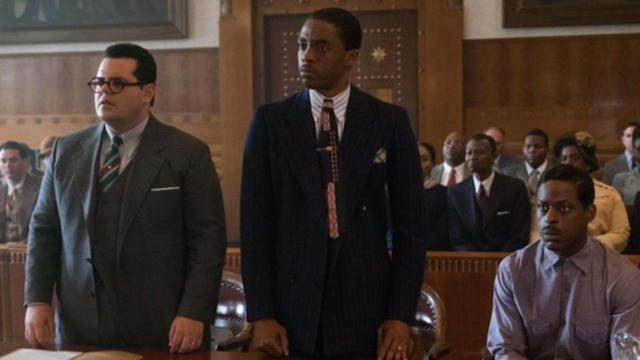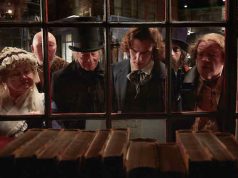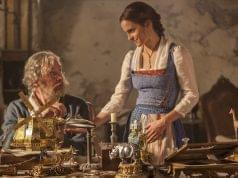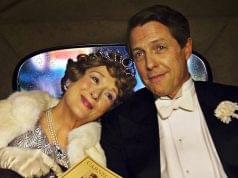
You’d be forgiven for assuming that “Marshall” is a biopic of Thurgood Marshall, the first black United States Supreme Court justice. After all, it’s called “Marshall,” and a main character is Thurgood Marshall. But rather than tell the man’s life story, the film focuses on one race-related case that he argued as a young lawyer in 1941, before he was famous. Marshall’s subsequent history-making achievements are relegated to the “what happened next” onscreen titles at the end of the movie.
That’s disappointing, though it’s worth noting that what we got instead is an entertaining courtroom drama whereas a standard biopic, if it followed the usual formula, would have had a good chance of being boring. Thurgood, in his early 30s and played by Chadwick Boseman (who’s already played Jackie Robinson and MLK), is an NAACP lawyer who travels the country defending falsely accused black people. This brings him to Bridgeport, Conn., where “colored” chauffeur Joseph Spell (Sterling K. Brown) is on trial for raping and almost killing his white employer, Eleanor Strubing (Kate Hudson). Spell looks Marshall in the eye and says he didn’t do it. Marshall believes him. Nobody else in the city (or the rest of the country) does.
Marshall mentions how glad he is to be working a case in the North, where he can enter a courtroom without fearing for his life, but there are still drawbacks. The judge (James Cromwell), hard-headed but ultimately deferential to the law, won’t let an out-of-state lawyer join the case without a good reason, and the perceived racial injustice in this affluent, lily-white town isn’t considered one. So Spell’s defender must be a local insurance attorney, Sam Friedman (Josh Gad), who’s timid and untested in high-stakes cases. Marshall is allowed to help and advise but outrageously not permitted to speak in open court. (This is a true story, but that detail is fictional.)
Much of the film is devoted to the nuts and bolts of working the case, with Marshall and Friedman interviewing witnesses, visiting the crime scenes, and fighting against the blatant racism and cronyism of the prosecutor, Loren Willis (Dan Stevens), and the local justice system. Friedman, initially concerned about his reputation defending a Negro accused of a heinous crime, gets over it and finds his courage, inspired by Marshall’s shrewd, impeccable professionalism. In fact, Friedman is more of a protagonist than Marshall is. It is he who changes, learns, and grows over the course of the movie, which was written by real-life Bridgeport, Conn., attorney Michael Koskoff and his screenwriter son, Jacob, and directed by Reginald Hudlin (“House Party,” “Boomerang”).
That’s another strike against the film as a Thurgood Marshall biopic: it’s more interested in the Josh Gad character. But to his credit, Gad’s performance is humble and nuanced, and he and Boseman have an easy camaraderie. It’s not their fault that Marshall’s brilliant legacy gets the short shrift in favor of a meat-and-potatoes courtroom mystery, albeit a satisfyingly twisty one. In a way, it’s a metaphor for the Civil Rights movement as a whole: we didn’t get what we wanted — a real Thurgood Marshall biopic is still ahead of us — but what we did get is a sympathetic and well-meaning step in the right direction.
B (1 hr., 58 min.; )





